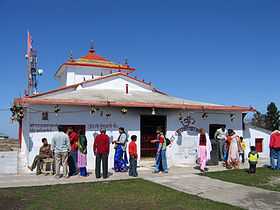Surkanda Devi
| Surkanda Devi | |
|---|---|
 | |
 Surkanda Devi Location in Uttarakhand
| |
| Coordinates: | 30°24′41″N 78°17′19″E / 30.411383°N 78.2887°ECoordinates: 30°24′41″N 78°17′19″E / 30.411383°N 78.2887°E |
| Name | |
| Proper name: | Surkanda Devi Temple |
| Location | |
| Country: | India |
| State: | Uttarakhand |
| District: | Tehri Garhwal |
| Location: | About 33.9 km, 57 mins far from The Mall Rd Mussoorie and 113 km, 2 hours 10 mins far from Devaprayag, Uttarakhand, India |
| Architecture and culture | |
| Primary deity: | Surkhanda Devi |
Surkanda Devi is a Hindu temple situated close to the small resort hamlet of Dhanaulti in Tehri District. It is at an altitude of about 2,757 metres, or 9976 ft; lies close to nearby hill stations of Dhanaulti (8 km) and Chamba (22 km)& walking distance of approx 3 km from Kaddukhal, the place where vehicles are parked.
It is surrounded by dense forests and affords a scenic view of the surrounding region including the Himalayas to the north, and certain cities to the south (e.g., Dehradun, Rishikesh) The Ganga Dussera festival is celebrated every year between May and June and attracts a lot of people.
Legend
One of the most persistent mythologies concerning the origin of worship at the site is associated with the myth of Sati, who was the wife of the ascetic god Shiva and daughter of the Puranic god-king Daksha. Daksha was unhappy with his daughter's choice of husband, and when he performed a grand Vedic sacrifice for all the deities, he did not invite Shiva or Sati. In a rage, Sati threw herself onto the fire, knowing that this would make the sacrifice impure. Because she was the all-powerful mother goddess, Sati left her body in that moment to be reborn as the goddess Parvati. Meanwhile, Shiva was stricken with grief and rage at the loss of his wife. He put Sati's body over his shoulder and began his tandava (dance of cosmic destruction) throughout the heavens, and vowed not to stop until the body was completely rotted away. The other Gods, afraid of their annihilation, implored Vishnu to pacify Shiva. Thus, wherever Shiva wandered while dancing, Vishnu followed. He sent his discus Sudarshana to destroy the corpse of Sati. Pieces of her body fell until Shiva was left without a body to carry. Seeing this, Shiva sat down to do Mahatapasya (great penance). Despite the similarity in name, scholars do not generally believe that this legend gave rise to the practice of sati, or widow burning.[1] According to various myths and traditions, there are 51 pieces of Sati's body scattered across the Indian subcontinent. These places are called shakti peethas and are dedicated to various powerful goddesses. the body was separated part by part. Shiva passed through this place on his way back to Kailash with the dead body of Sati whose head fell at the spot where the modern temple of Surkhanda Devi stands.[1]
Reaching there
The spot is most easily reached from the southwest via Dehradun, but is a typical day-trip for visitors to Mussoorie and Landour. It is located on a hill and one reaches there after a steep 1 km km trek, from village Kaddukhal, on the Dhanaulti - Chamba road.[2] About 33.9 km, 57 mins. from The Mall Rd Mussoorie and 113 km, 2 hours 10 mins far from Devaprayag, Uttarakhand, India
References
External links
| ||||||||||||||||||||||||||||||||||||||